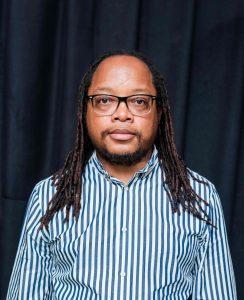 Professor Kondwani Jambo is a Research Group Leader based at the Malawi-Liverpool-Wellcome Research Programme (MLW) and a Professor of Immunology and Infection at the Liverpool School of Tropical Medicine, United Kingdom. He holds a PhD in Immunology (2010), from the University of Liverpool, UK and underwent postdoctoral training at the MLW and Cornell University, USA. He is a previous recipient of three prestigious fellowships, the Wellcome International Intermediate Fellowship (2015), the MRC /FCDO African Research Leader award (2020), and the Gates Foundation Calestous Juma Science Leadership Fellowship (2025). Prof. Jambo is a member of the Federation of African Immunological Societies (FAIS) executive committee, the current president of the Immunology Society of Malawi, the Lead of the Discovery Research Support Hub, and the founder and director of the Science For All Foundation.
Professor Kondwani Jambo is a Research Group Leader based at the Malawi-Liverpool-Wellcome Research Programme (MLW) and a Professor of Immunology and Infection at the Liverpool School of Tropical Medicine, United Kingdom. He holds a PhD in Immunology (2010), from the University of Liverpool, UK and underwent postdoctoral training at the MLW and Cornell University, USA. He is a previous recipient of three prestigious fellowships, the Wellcome International Intermediate Fellowship (2015), the MRC /FCDO African Research Leader award (2020), and the Gates Foundation Calestous Juma Science Leadership Fellowship (2025). Prof. Jambo is a member of the Federation of African Immunological Societies (FAIS) executive committee, the current president of the Immunology Society of Malawi, the Lead of the Discovery Research Support Hub, and the founder and director of the Science For All Foundation.
His research focuses on understanding the pathogenesis of mucosal-acquired pathogens that pose significant health challenges to low- and middle-income countries, including HIV, Streptococcus pneumoniae, Mycobacterium tuberculosis and emerging pathogens. He aims to develop, adapt or optimise immunisation strategies to mitigate transmission of these mucosal-acquired pathogens.
What inspired you to specialise in infectious disease research, and how has your journey shaped your perspective on global health challenges?
My decision to pursue research in infectious diseases was driven by the substantial impact of these diseases in my community.
Can you share some of the most significant breakthroughs or challenges you have encountered in your research?
One of my most significant breakthroughs in science was the identification of a subgroup of alveolar macrophages that are preferentially infected by HIV and persist even during long-term suppressive antiretroviral therapy. The other occurred during the COVID-19 pandemic, when we were among the first teams to report evidence of high community transmission of SARS-CoV-2, yet with no corresponding severe disease outcomes, as observed in the USA, China, and the UK.
How do you see the role of immunology evolving in tackling diseases in Africa?
Immunology gained significant prominence worldwide during the COVID-19 pandemic. As such, immunologists on the continent need to capitalise on this goodwill to promote knowledge sharing within the community and foster the development of the next generation of immunologists. The role of immunology in tackling diseases in Africa must be further developed to enable us on the continent to significantly contribute to the creation of solutions (e.g. vaccines) for the high burden of infectious diseases, rather than continuing to be consumers.
We know you are involved in FAIS and the Immunology Society of Malawi. What initiatives are you most passionate about in strengthening immunology research in Africa?
I am particularly passionate about strengthening immunology research in Africa through regional training programmes, such as the Infectious Diseases in Africa Symposium, the African Flow Cytometry Workshop, and the African ImmunoBiology of Parasites, Pathogens, and Pathogenesis course. Furthermore, in Malawi, through the Science For All Foundation, we run programmes aimed at promoting science education and careers among students in primary, secondary, and tertiary education.
How do you balance your leadership roles with your scientific research, and what advice would you give to young scientists aspiring to take on leadership positions?
I do not believe in referring to it as a balance between scientific research and leadership roles. In my case, I ensure that my leadership roles stem directly from my vision, purpose, and passion. Therefore, my leadership roles reflect my scientific research. This is why I have incorporated a training strategy into my science strategy, enabling me to offer internships (Pre-BSc, Pre-MSc and Pre-PhD) and PhD studentships alongside all my research projects, creating a pipeline of next-generation scientists while conducting high-quality science and delivering on the research objectives.
I encourage young scientists not to avoid leadership roles, but to ensure that these roles embody their vision, purpose, and passion. Science is not merely about data; it is also about influence, and influence is expressed through leadership.
Looking ahead, what are the most exciting developments in immunology and tropical medicine that you believe will shape the future of global health?
The most exciting developments in immunology and tropical medicine are the emergence of human studies in discovery and experimental medicine, including controlled human infection models, as well as the rise of advanced data science analytics tools for big data. These scientific approaches will revolutionise the way we develop and test interventions, as well as enhance our understanding of human immunology at an unprecedented scale. This will define the future of global health, but if Africa does not play a significant role, the inequality gap will widen further than it currently is.
What would you like to say to inspire future immunologists?
Immunology is a rapidly evolving and fascinating field. Question everything; do not settle for dogma that is not supported by actual data.
How do you think teaching and learning immunology will change in the next 10 years?
It will change significantly, as the emergence of Ai and LLMs will render teaching and learning immunology through textbooks nearly obsolete, given the rapid generation of knowledge in this highly evolving field. We must embrace the emerging tools and promote their responsible use while expanding our understanding of the human immune system in health and disease.
Interview by Bonamy (Bon) Holtak










